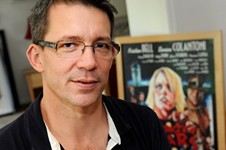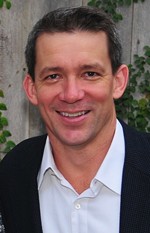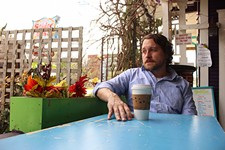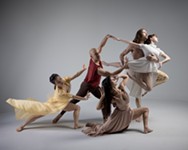The Universal High School Experience
Sarah Dessen's latest novel is 'The Moon and More'
By Amy Gentry, 10:00AM, Thu. Sep. 26, 2013
Sarah Dessen hated high school. So how did she become a bestselling author of young adult novels? With typical Southern modesty spiced with just the faintest whiff of irony, she admits, “All people thought was any good were my stories about the prom.”
In addition to proms, Dessen’s books are rife with all the trappings of teen angst: mysterious boys who move in next door, best friends who start experimenting with dangerous drugs, and parents who die, leave, or, at the very least, insist that you try out for cheerleader. But the teenage readers who turn out for her book signings in droves – along with quite a few adult women who grew up on her compulsively readable tales of teen angst and still read them unabashedly – are after more than Degrassi-style drama. They identify with her strongly written and believable female narrators, who are moody, snappish, and stubborn in believable doses. Perceptive without being overly precocious and unique without being overly quirky, Dessen’s protagonists strike a rare balance in the young adult world. Above all, they are supremely vulnerable.
Like Rob Thomas, with whom she will be sharing a keynote at the Austin Teen Book Festival this weekend (coincidentally, their debut YA novels came out the same year, 1996), Dessen didn’t set out to be a young adult novelist. Having grown up in Chapel Hill in the shadow of the University of North Carolina, where both her parents were professors, Dessen went through the UNC undergraduate writing program and imagined herself writing “literary fiction for adults.” In her years immediately after college, Dessen worked as personal assistant to the novelist Lee Smith in the mornings and held down a waitressing job at night; she wrote between 2pm and 5pm, her only free time during the day.
After her first two novels didn’t sell, Dessen wrote a novel featuring a 15-year-old protagonist. “My agent got interested, and she said, ‘Oh, this is YA.’ I was actually very hesitant, because at that point YA still had more … I wouldn't say a stigma, but it was a much more narrow category than it is now. She was like, ‘Just trust me.’ And before I knew it, I was a YA author.” And a highly successful one: She has written 11 novels, and her first two, That Summer and Someone Like You, were turned into a 2003 Mandy Moore vehicle called How to Deal. Her most recent novel is called The Moon and More.
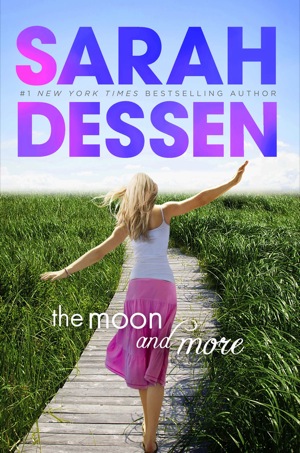
On the phone, Dessen was warm, chatty, and self-deprecating, with a hint of Southern twang. We spoke about her childhood in Chapel Hill, why she only writes female progatonists, and whether the best person to write about teenagers is someone who hated being one.
Austin Chronicle: When did you start writing?
Sarah Dessen: I always liked to write. I grew up in a family of readers, so I read a lot. When I finished books that I liked, I always wanted there to be more to the books, so I would often write my own endings. It's called fan fiction now, but that was before it actually had a name. I wrote some in school, and I knew that my friends wanted to pass my stories around between classes and stuff, but I never really took it seriously until I went to college. It took a teacher of mine saying to me, "I think you could do this; you could be a writer," to make me even think that it was something that was possible.
AC: As a child, or a teenager, what kind of stuff did you like to read?
SD: As a child, a lot of picture books. I was very much into the Curious George stuff. And I read Gone with the Wind when I was in about fifth grade. Which, I don't know if that's a rite of passage for a Southern girl …
AC: It was for me!
SD: Yes! I loved that book. Remember what a huge achievement it was? Because it was like this big, thick book. It was one of the longest books I had ever read; I was very proud of myself. And I remember the first time I read Rebecca, by Daphne Du Maurier. That was one of those light-bulb moment books for me. The big twist at the end – I was like, "Oh my goodness!" The first time a book just completely rocked my world was Rebecca. And then in high school, middle school, I read a lot of Lois Lowry, Judy Blume – obviously, because I was right in that generation – Forever, Deenie, all that kind of thing. And I read a lot of Southern fiction, also. Because I was living in a place where there were a lot of female southern writers that I could both read and see read, and hear them talk about their work. My mom always gave me books that were a little bit older than what I was reading, so I would have to come to her and ask questions and we could talk about them together. But I read basically anything I could get my hands on.
AC: Do you think there's anything specifically about your upbringing, your adolescence, that gives you a special insight as an adult into what it's like for kids?
SD: Well, I mean, I was pretty miserable in high school, to be honest. I wasn't anything exemplary. I wasn't a good student, I wasn't an athlete, I wasn't a joiner. I had a core group of really good girl friends, and I kind of fell in with a bad group – that I'm still with, but now we're all old and have jobs and kids and everything. But I was definitely a little bit more of a rebellious teen than someone that my parents were particularly proud of back then – I hope they've changed their minds at this point. But I think it's funny, because I hated high school so much; I couldn't wait to get out. I remember sitting at graduation with all these people that were all nostalgic, and I was like, "Get me out of here, I hate all of you people, I'm never going to think about you ever again." And then when I was in college, I realized I had all these stories, and I actually had a lot to say about high school. So it's kind of ironic that I couldn't wait to stop thinking about it, and now I spend half my day with my foot back in high school. Every single day. I don't know if it's a punishment or an irony. But I think my high school experience is much easier to deal with with a little bit of hindsight.
AC: Do you ever feel like you're writing to your younger self?
SD: I don't know if it's to my younger self, but I'm definitely trying to write myself out of a lot of the stuff. Maybe give it more of a happy ending, or maybe sort of reach that girl who was feeling pretty despondent at times, and lost. I think we are all sort of revisionists, in our own way. And I think to be able to write about these girls that are facing changes and having hard times, and then finding their way through and getting to a pretty happy ending, not always perfect ending, but to a better place. … I mean, that is a way of making peace with my own past in a lot of ways.
AC: You have a daughter. How old is she?
SD: She’s about 5½. She's starting kindergarten this fall. We are very deep into princesses, and fairies, The Stinky Cheese Man, and all of those kind of things. Fancy Nancy, that's where I'm at right now with her.
AC: It’ll be a little while before she's reading your books.
SD: Yeah, and I'm really curious! I think my mom has been sort of sitting off to the side, gleefully rubbing her hands together, like, she can't wait until I have a teenager – until I get payback, as far as she's concerned. But I already feel like I look at the moms in my book so much differently, ever since I became a mom. Before, the mom character was the foil, she was kind of trying to smother my narrator, and now I have so much more sympathy for the moms. I'm like, "They're just doing the best they can! It's really hard!" It definitely has widened my perspective. Regular readers have noticed that there are more children in my books than there used to be, because whenever you're writing and you have something in your day-to-day life, it just sort of creeps into your writing whether you realize it or not.
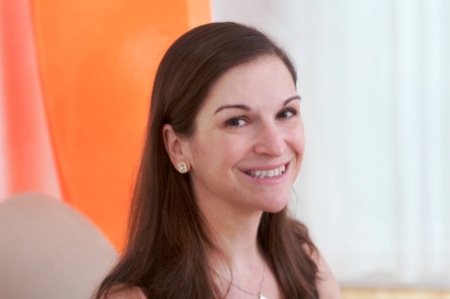
AC: What are the things that you see kids today dealing with? Are there things you didn't have to experience growing up, but that you have to put into your books because they're problems now?
SD: Well it's challenging, for sure, because I graduated in 1988, a million years ago. I think the biggest difference is the social media. We just didn't have something like that. All of the pressures that you were experiencing back in the Eighties in school, with people talking about you, or criticizing you, or looking at what you were wearing, or making fun of you… It was one thing if that was happening to your face, or even behind your back and you were hearing about it from other people, but now it's all over the Internet. It terrifies me! Who knows what will be going on when my daughter's in high school. It's the biggest difference.
I've addressed it in some ways, but I do try to sort of stick to the things that are more timeless. Because I feel like I can speak more to those things than the things I didn't have experience with specifically in high school. The problems you have with your parents or your friends, or the boy you like in class that doesn't know you’re alive, and that kind of thing. There’s some things that haven't changed, and I tend to gravitate more toward those. … For years I didn't put texting in my books, and then I was like, "Really, I have to make peace with this, it's here to stay." The same with iPods, and everybody having a phone. I was really resistant, because I've gone back and read the books from my teen years, the ones that are still in print, and they are really dated. I want my books to be timeless, I want girls 10 years from now to be able to read them and relate to them. It’s very tricky. You don't want to put stuff in that's so antiquated, that they're like, "What is that?" They might as well be using an abacus or a tin-can phone or something. So it's a very delicate thing. But I think some people err on the other side, and they think, "The only thing I have to do if I want to write for teenagers is put a bunch of gadgets and slang in there, and that will make it appeal to them."
AC: I remember reading Are You There God? It's Me, Margaret., and even though there were things in there that I didn’t even understand what they were talking about, the timeless stuff still grabbed me.
SD: I heard they had gone back and changed some of the things so it’s not quite so dated. I don't know that many people that are wearing, like, Kotex belts. …
Judy Blume was like a religion for girls my age. I met Judy Blume a few years ago, and I was basically speechless. I acted like an idiot. I couldn't even put words together. Because to me, she was just… You felt like Judy Blume was the only person that understood you in your whole life, at that time. That’s a pretty big responsibility for an author to have.
AC: Who’s working in YA right now that you admire and model yourself after?
SD: There’s so much great stuff happening in YA. When I sold my first book in 1994, it was a pretty small pool. My book came out in 1996, YA books were still shelved with picture books. So it would be like Babar the Elephant, my book, and Strawberry Shortcake all next to each other. Now we have the teen section that is separate, and we have the YA section, and we have all these different subsects of dystopian and paranormal. I am still drawn toward contemporary realistic fiction.
I think the best writer right now in YA, or one of the best, is John Green. I think he's tapped into this sort of culture of adolescence that nobody else has really been able to describe as well. I also love Laurie Halse Anderson: She has really sort of inspired me in the stuff she writes for girls, and difficult topics that girls can really relate to. I also like Gayle Forman – so many great people out there. So many different voices, which I think is what you need when you're a teenager. Everybody's different, and everybody's going through something different, so the more voices we have, the more there is to appeal to teens.
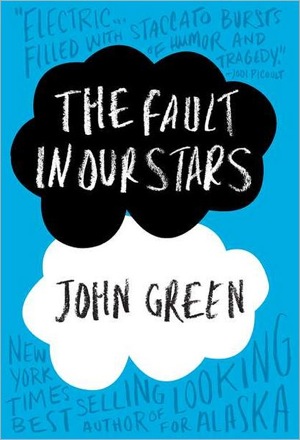
AC: What about the gender split? in YA, some of the subgenres do seem more unisex, but realistic fiction, if I'm not mistaken, is still pretty divided.
SD: I know a lot of boys don't read my books – not that I'm surprised, because they tend to be pink. But occasionally! I had a guy show up in my signing… And I’m always very excited when they show up in my signing line, sometimes I get over-excited, and then they say, "Oh, this is for my girlfriend" or "This is for my sister." But this guy said, "Oh yeah, I read this book in high school, and I just saw you were here and I came to get it signed." I like to think my books are universal and anybody who has had the high school experience, whether they're going through it now, or whenever, can relate. But I do understand that I write from the point of view of girls, and it's harder maybe… I think girls will read books from the boy's point of view, but it's harder for boys to read books from a girl's point of view. I don't know, that's sort of been my impression. Librarians are better at discussing that topic than I am. But I love it when I see a boy.
I had one teacher somewhere that assigned one of my books in class and had everybody write me letters about it. And I loved the letters from the boys. Not that I didn't love the letters from the girls, but the letters from the boys were like, "I really thought I'd hate this book, but it wasn't that bad!" I'm like, thank you! I think that's a compliment, and I understand. It's funny, I get asked a lot, because all my narrators are girls, if I'm going to write from the point of view of a boy. And I say, "I spent all of high school wondering what boys were thinking." I still don't know what my husband is thinking half the time. I don't know why he does what he does, I'm like, "What does that even mean, that you just said to me?" I don't think I could put myself in a boy’s mind. Never say never, but I just think I would be clueless.
AC: I often wonder about what would happen if a teacher were to pass out books like yours and John Green’s, and everyone’s, with no covers, or bound the way they’re bound in a college library. What books would they like?
SD: Yeah, the covers work both for and against you. We just put new covers on all my backlist, and there was so much back and forth: What is this, what is that, what are they going to think, and is this pretty enough? When I've written a book and spent all this time and copyedited it and got it all ready to go, they'll suggest a cover for it that is just not good, and I'm like, "Don't do it!" It's like a death curse on your book. Unfortunately, it's just human nature. But I think you’re right, it would be an interesting thing to see, if you just picked up a book and read it, or gave it to a group of high schoolers, boys and girls, and didn't say whether it was written by a man or a woman … That would be an interesting research project.
AC: Is there anything you fantasize about writing that you haven't written yet?
SD: Because I've written just about high school, there is a part of me that wants to write about my 20s, and about, you know, being a mom, that kind of thing. I just haven't gotten the right idea yet. I have a lot of girls who say: "I started reading these books in high school, and now I'm in my 20s, and I'm sort of embarrassed that I'm here with all these teenagers, but I love your books. When are you going to write about me? When are you going to write about after?" I wasn't ready to write about high school until after high school, and I'm not sure when I'm going to be ready to write about my 20s. I think eventually my narrators are going to have to grow up a little bit. But it's really hard when you have such a devoted audience. It’s scary to think, "Oh, maybe I'll try to write for a market that isn't acquainted with me at all – or I can stay where I am where I have this very supportive community of people." But I think eventually, I would love to write about those early years of marriage, and especially about being a mom.
Right now I'm writing about those things through secondary characters. Along for the Ride – I wrote that right after my daughter was born, and the stepmother of the narrator has a very fussy baby. My baby, my daughter, was very fussy. So that's how I'm handling it so far. But eventually, I might have to have the older character take center stage. Maybe.
Sarah Dessen speaks this Saturday, Sept. 28, at the Austin Teen Book Festival alongside Rob Thomas. See more information on the event here.
A note to readers: Bold and uncensored, The Austin Chronicle has been Austin’s independent news source for over 40 years, expressing the community’s political and environmental concerns and supporting its active cultural scene. Now more than ever, we need your support to continue supplying Austin with independent, free press. If real news is important to you, please consider making a donation of $5, $10 or whatever you can afford, to help keep our journalism on stands.
Amy Gentry, Sept. 26, 2013
Monica Riese, May 8, 2013
Austin Teen Book Festival, Sarah Dessen, The Moon and More, Rob Thomas, John Green, The Fault in Our Stars, Laurie Halse Anderson, Gayle Forman





